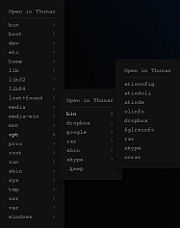Openbox:Pipemenus:Dirsmenu
From Openbox
(Difference between revisions)
AaylaSecura (Talk | contribs) |
AaylaSecura (Talk | contribs) m |
||
| Line 19: | Line 19: | ||
if ( "$ARGV[0]" ne "" ) { $base_dir = "$ARGV[0]"; } | if ( "$ARGV[0]" ne "" ) { $base_dir = "$ARGV[0]"; } | ||
| − | # list directories and links as submenus | + | # list directories and links to such as submenus |
my @dirs = sort split /\n/, `find -L "$base_dir" -maxdepth 1 -type d -or -type l`; | my @dirs = sort split /\n/, `find -L "$base_dir" -maxdepth 1 -type d -or -type l`; | ||
| − | # include all other types in the file list (regular, block, character, etc) | + | # include all other types in the file list (regular, block, character, etc and links to such) |
my @files = sort split /\n/, `find -L "$base_dir" -maxdepth 1 ! -type d -and ! -type l`; | my @files = sort split /\n/, `find -L "$base_dir" -maxdepth 1 ! -type d -and ! -type l`; | ||
Revision as of 19:17, 9 June 2014
Another pipe menu for recursive directory listing. I tried to keep the code as simple and short as possible. It uses find to get the directories and the other files in the current directory and lists them in alphabetic order while making each directory a submenu. It escapes special characters and prints the underscore correctly (unlike obbrowser).
#!/usr/bin/perl
# Openbox menu to recursively list directories and files.
use File::Basename;
sub say {print @_, "\n"}
# set starting directory - this changes when the script is called with an argument (used for listing subdirectories)
my $base_dir = '/';
# path to this script (needed as it calls itself to list subdirectories)
my $path = "$ENV{HOME}/obmenus";
# your file browser
my $browser = 'Thunar';
# when listing subdirectories, set the starting dir accordingly
if ( "$ARGV[0]" ne "" ) { $base_dir = "$ARGV[0]"; }
# list directories and links to such as submenus
my @dirs = sort split /\n/, `find -L "$base_dir" -maxdepth 1 -type d -or -type l`;
# include all other types in the file list (regular, block, character, etc and links to such)
my @files = sort split /\n/, `find -L "$base_dir" -maxdepth 1 ! -type d -and ! -type l`;
say "<openbox_pipe_menu>";
say "<item label=\"Open in $browser\">";
say " <action name=\"Execute\"><execute>$browser \"$base_dir\" </execute></action>";
say "</item>";
say "<separator />";
# print directories first in alphabetic order (hidden first)
# also exclude . from directory list
DIRS: foreach my $dir (@dirs) {
if ( $dir eq $base_dir ) { next DIRS; }
# tested with various special characters and only &,< and " needed to be replaced by their html codes
$dir =~ s/&/&/sg;
$dir =~ s/</</sg;
$dir =~ s/"/"/sg;
# replace the underscore with a double underscore in the label to prevent openbox from interpreting it as a keyboard accelerator
my $stripped_dir = basename($dir);
$stripped_dir =~ s/_/__/sg;
say "<menu id=\"$dir\" label=\"$stripped_dir\" execute=\"$path/dirsmenu \'$dir\'\" />";
}
# print files next in alphabetic order (hidden first)
foreach my $file (@files) {
$file =~ s/&/&/sg;
$file =~ s/</</sg;
$file =~ s/"/"/sg;
my $stripped_file = basename("$file");
$stripped_file =~ s/_/__/sg;
say "<item label=\"$stripped_file\">";
say " <action name=\"Execute\"><execute>xdg-open \"$file\" </execute></action>";
say "</item>";
}
say "</openbox_pipe_menu>";
